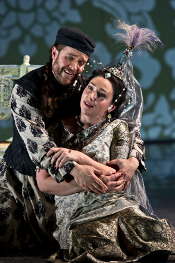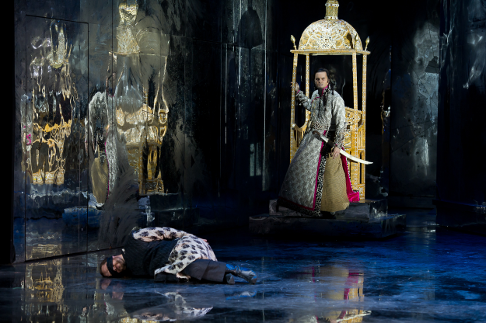![Ryan McKinny Tiridate and Sophie Bevan as Polissena [Photo by Clive Barda courtesy of English National Opera]](http://www.operatoday.com/Radamisto_Sophie_Bevan_Ryan_McKinny_credit_Clive_Barda.png)
10 Oct 2010
Technicolour Radamisto at ENO
Handel’s Radamisto came to the ENO at the Coliseum in glorious technicolour.
English Touring Opera are delighted to announce a season of lyric monodramas to tour nationally from October to December. The season features music for solo singer and piano by Argento, Britten, Tippett and Shostakovich with a bold and inventive approach to making opera during social distancing.
This tenth of ten Live from London concerts was in fact a recorded live performance from California. It was no less enjoyable for that, and it was also uplifting to learn that this wasn’t in fact the ‘last’ LfL event that we will be able to enjoy, courtesy of VOCES8 and their fellow vocal ensembles (more below …).
Ever since Wigmore Hall announced their superb series of autumn concerts, all streamed live and available free of charge, I’d been looking forward to this song recital by Ian Bostridge and Imogen Cooper.
The Sixteen continues its exploration of Henry Purcell’s Welcome Songs for Charles II. As with Robert King’s pioneering Purcell series begun over thirty years ago for Hyperion, Harry Christophers is recording two Welcome Songs per disc.
Although Stile Antico’s programme article for their Live from London recital introduced their selection from the many treasures of the English Renaissance in the context of the theological debates and upheavals of the Tudor and Elizabethan years, their performance was more evocative of private chamber music than of public liturgy.
In February this year, Albanian soprano Ermonela Jaho made a highly lauded debut recital at Wigmore Hall - a concert which both celebrated Opera Rara’s 50th anniversary and honoured the career of the Italian soprano Rosina Storchio (1872-1945), the star of verismo who created the title roles in Leoncavallo’s La bohème and Zazà, Mascagni’s Lodoletta and Puccini’s Madama Butterfly.
Evidently, face masks don’t stifle appreciative “Bravo!”s. And, reducing audience numbers doesn’t lower the volume of such acclamations. For, the audience at Wigmore Hall gave soprano Elizabeth Llewellyn and pianist Simon Lepper a greatly deserved warm reception and hearty response following this lunchtime recital of late-Romantic song.
Collapsology. Or, perhaps we should use the French word ‘Collapsologie’ because this is a transdisciplinary idea pretty much advocated by a series of French theorists - and apparently, mostly French theorists. It in essence focuses on the imminent collapse of modern society and all its layers - a series of escalating crises on a global scale: environmental, economic, geopolitical, governmental; the list is extensive.
For this week’s Live from London vocal recital we moved from the home of VOCES8, St Anne and St Agnes in the City of London, to Kings Place, where The Sixteen - who have been associate artists at the venue for some time - presented a programme of music and words bound together by the theme of ‘reflection’.
'Such is your divine Disposation that both you excellently understand, and royally entertaine the Exercise of Musicke.’
Amongst an avalanche of new Mahler recordings appearing at the moment (Das Lied von der Erde seems to be the most favoured, with three) this 1991 Mahler Second from the 2nd Kassel MahlerFest is one of the more interesting releases.
‘And there was war in heaven: Michael and his angels fought against the dragon; and the dragon fought and his angels, And prevailed not; neither was their place found any more in heaven … that old serpent … Satan, which deceiveth the whole world: he was cast out into the earth, and his angels were cast out with him.’
If there is one myth, it seems believed by some people today, that probably needs shattering it is that post-war recordings or performances of Wagner operas were always of exceptional quality. This 1949 Hamburg Tristan und Isolde is one of those recordings - though quite who is to blame for its many problems takes quite some unearthing.
There was never any doubt that the fifth of the twelve Met Stars Live in Concert broadcasts was going to be a palpably intense and vivid event, as well as a musically stunning and theatrically enervating experience.
‘Love’ was the theme for this Live from London performance by Apollo5. Given the complexity and diversity of that human emotion, and Apollo5’s reputation for versatility and diverse repertoire, ranging from Renaissance choral music to jazz, from contemporary classical works to popular song, it was no surprise that their programme spanned 500 years and several musical styles.
The Academy of St Martin in the Fields have titled their autumn series of eight concerts - which are taking place at 5pm and 7.30pm on two Saturdays each month at their home venue in Trafalgar Square, and being filmed for streaming the following Thursday - ‘re:connect’.
The London Symphony Orchestra opened their Autumn 2020 season with a homage to Oliver Knussen, who died at the age of 66 in July 2018. The programme traced a national musical lineage through the twentieth century, from Britten to Knussen, on to Mark-Anthony Turnage, and entwining the LSO and Rattle too.
With the Live from London digital vocal festival entering the second half of the series, the festival’s host, VOCES8, returned to their home at St Annes and St Agnes in the City of London to present a sequence of ‘Choral Dances’ - vocal music inspired by dance, embracing diverse genres from the Renaissance madrigal to swing jazz.
Just a few unison string wriggles from the opening of Mozart’s overture to Le nozze di Figaro are enough to make any opera-lover perch on the edge of their seat, in excited anticipation of the drama in music to come, so there could be no other curtain-raiser for this Gala Concert at the Royal Opera House, the latest instalment from ‘their House’ to ‘our houses’.
"Before the ending of the day, creator of all things, we pray that, with your accustomed mercy, you may watch over us."
![Ryan McKinny Tiridate and Sophie Bevan as Polissena [Photo by Clive Barda courtesy of English National Opera]](http://www.operatoday.com/Radamisto_Sophie_Bevan_Ryan_McKinny_credit_Clive_Barda.png)
Handel’s Radamisto came to the ENO at the Coliseum in glorious technicolour.
Images of Asia proliferate polygamously — Mughal India, Tokugawa Japan, and Chinese restaurant chic, tumbled randomly together. The text, of course, mentions Armenia. Visual indigestion, if you’re culturally aware. But to Handel and his audiences, specifics didn’t matter. Radamisto is a morality tale which transcends time and place.
Tiridate (Ryan McKinny) lusts for Zenobia (Christine Rice) who’s happily married to Radamisto (Lawrence Zazza). To win her he’ll drop his wife Polissena (Sophie Bevan) and usurp Farasmane’s kingdom (Henry Waddington). But Zenobia’s having nothing of it. She’d rather die than be unfaithful. Subplots and complications (they’re all family, for example) are decorative embellishments. The basic message is surprisingly simple: love overcomes all.
This fundamental chastity pervades the whole opera. Structurally, it’s very tight. In neat succession, set piece arias follow one another, allowing each singer to display his or her vocal virtuosity.Simplicity of form, allowing inventive elaboration without blurring the basic line. Much like the set designs. Despite being floridly over the top, these designs are much more minimal than appear at first.
 Christine Rice as Zenobia and Lawrence Zazzo as Radamisto
Christine Rice as Zenobia and Lawrence Zazzo as Radamisto
Lawrence Zazzo’s Radamisto is superb. His tessitura isn’t forced but
flows well, carefully modulated and well-judged, important in a role which
stresses integrity. The extended rhapsody on honour is particularly striking,
decorations extending each word, yet flowing naturally, without affectation.
You marvel at the inventiveness, but also meditate on meaning. Honour does
matter, Radamisto keeps saying as he and Zenobia amply demonstrate. These
aren’t just “words”, dwelling on them serves a moral as well as artistic
purpose.
The contrast between Radamisto and Tiridate is enhanced counterbalancing Zazzo’s countertenor with Ryan McKinny’s bass-baritone. In baroque, low voices often signify villains, but McKinny doesn’t overdo the inherent power in his voice. Instead he relies on subtle expression, using agile legato. In any case, refinement enhances the role. Tiridate holds a sword poised to kill Radamisto, but the long, lyrical elaboration deflects the menace, Reality, in Handel, is deeper than it seems on the surface.
Christine Rice is exquisitely dignified and gracious. In Carmen, she seemed inhibited, and even as Ariadne in Birtwistle’s The Minotaur she didn’t access the kinkier aspects of the role. As Zenobia, however, she’s ideal. Her patrician reserve perfectly fits the role, so she can create Zenobia’s compelling beauty with her voice. Sophie Bevan’s Polissena and Henry Waddington’s Farasmane impressed too. Ailish Tynan’s Tigrane reached notes higher than might be expected.
 Scene from Radamisto
Scene from Radamisto
So what was my biggest misgiving about this production? David Alden depicts Tigrane as a grotesque, a camp cross between Sidney Greenstreet and King Farouk, but for no conceivable purpose. Is he trying to inject comic humour? Perhaps it works in a grubby sort of way but it jars with the noble import of this opera. The whole point, for Handel, was to edify. The idea of morality trouncing tyranny was inherently racy in a time when absolute monarchy still held sway. Besides, Tigrane is arguably a hero since it’s he who selflessly resolves matters. This portrayal is misogynistic and homophobic, completely pointless. Admittedly it was part of the 2008 Santa Fe premiere but it’s still deeply offensive and should be dropped.
What Alden lacks in sensitivity, Laurence Cummings made up for with the orchestra, who played with brio under his direction.
Anne Ozorio